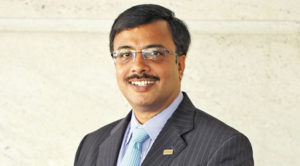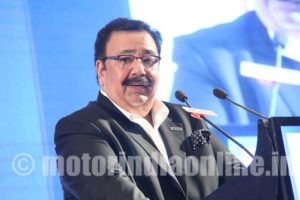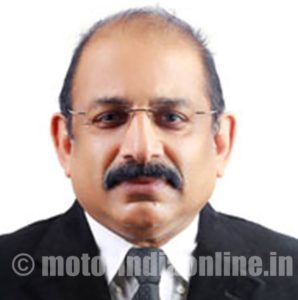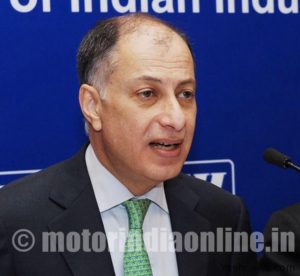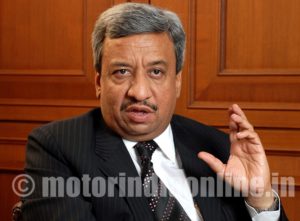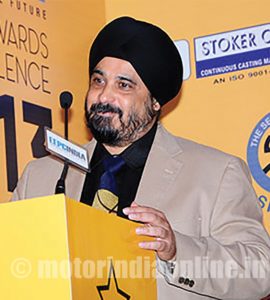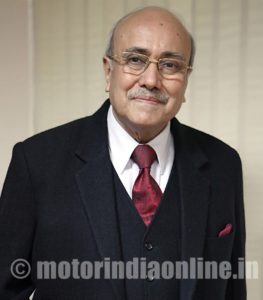Mr. Vinod K. Dasari, President, Society of Indian Automobile Manufacturers (SIAM), welcomed the Union Budget 2017-18 and stated that it has a lot of positives for the automotive industry. SIAM expects the growth in auto industry to rebound to the pre-demonetization level through revival of the rural market and substantial increase in expenditure on infrastructure, which are two key factors responsible for the recent growth of the industry.
Mr. Dasari, however, expressed his disappointment that auto industry’s request for the incentive based fleet modernization scheme has again not found support in the budget. Moreover, there was a genuine case for continuation of 200% weighted deduction on R&D expenses for Auto industry, which remained unacknowledged in budget proposals. However, he expressed satisfaction that Rs. 175 crores has been allocated towards funding of the electric & hybrid vehicle program, through FAME scheme.
However, the issue of 10-13 seater small buses, falling under heading 8702, which continues to attract 27% excise duty due to a separate classification for such vehicles, remained unaddressed.
He also expressed satisfaction on noting that as suggested by SIAM the R&D Cess on import of technology has been abolished and the scope of domestic transfer pricing provisions have been restricted to reduce compliance burden. SIAM had submitted many more procedural simplification suggestions for GST and hope that those suggestions will be taken into consideration when GST Rules are framed.
ACMA hails remonetisation of economy
The Automotive Component Manufacturers Association of India (ACMA), has welcomed the measures announced in the Union Budget providing the much needed thrust to the economy through measures for rural development, infrastructure development, skilling, announcement of GST, affordable housing, among others.
Congratulating the Finance Minister, Arun Jaitley, ACMA President, Rattan Kapur, said: “The Budget unveiled by Finance Minister gives adequate focus to development of the rural and social sector, as well as, to the industry and infrastructure. The emphasis on strengthening the rural economy will lead to positive impact on demand for vehicles and farm equipment. ACMA also welcomes the reduction in corporate tax on MSMEs giving them the much needed encouragement and relief; over 70 per cent of the companies engaged in the auto component sector are small and medium enterprises. Further, with growing content of electronics in vehicles, most of which is imported, it is encouraging to note that the Budget has an increased allocation of Rs. 745 crores for electronics manufacturing.”
An industry-friendly Budget: FADA
Commenting on the proposals made in the Budget, Mr John Paul, President, Federation of Automobile Dealers Associations (FADA), observed: “Mr. Arun Jaitley, Union Finance Minister, has adopted a cautious and balanced approach and focussed on long-term growth prospects so far as the Union Budget 2017 is concerned. The automotive sector, which has been reeling under severe slowdown in the wake of demonetisation of high currency notes, was expecting the announcement of immediate relief measures in the Union Budget for its revival. The Union Budget 2017 falls short of that expectation in that there are no specific budget proposals giving relief to the auto sector or, for that matter, manufacturing sector.”
However, big push given in the Budget to the infrastructure development and renewed emphasis on rural & agriculture sector with substantially higher outlays, as also the 25.4% increase in central capital expenditure during the financial year 2017-18 will have ripple effect on the economy as a whole, including auto sector. Another comforting fact is that the Fiscal Deficit for the year 2017-18 has been pegged at 3.2 per cent without compromising on the outlays for various sectors and economic growth.
Focus on higher transparency: CII
The Budget 2017-18 unleashes multiple instruments to revive demand and encourage investments, while also prioritizing the needs of vulnerable sections of society, said the Confederation of Indian Industry (CII).
“The Finance Minister is to be complimented for delivering a prudent and pragmatic Budget that caters to most sectors of the economy,” stated Dr. Naushad Forbes, President, CII. “Industry welcomes the cut in personal and corporate income tax rates. The economic reform agenda continues at a rapid pace, with abolishing of FIPB and move for time-bound listing of CPSEs. The Budget focuses on measures to increase transparency with a broad strategy to put in place the mechanisms and institutions for the future of the country, including through digitalization and formalization of the economy.”
The key measure of slashing the corporate income tax for companies with a turnover of less than Rs. 50 crores at one go from 30% to 25% covering 96% of all companies is greatly welcome, stated the CII President. “This is in line with CII’s recommendation to bring down the corporate income tax rate to build the competitiveness of the Indian economy as per comparator countries.”
It was heartening to note that the GST implementation is on track through strong efforts and commitment of the Finance Ministry and the State Governments. CII looks forward to its rollout which will be a key step in the transformation of the economy.
A big boost to growth, says FICCI President
Commenting on the Union Budget 2017-18, Mr. Pankaj Patel, President, Federation of Indian Chambers of Commerce and Industry (FICCI), said: “This Budget would tremendously strengthen the economic muscle of the country. It is directionally correct, fiscally prudent and strengthens the governance fabric of the nation. FICCI compliments the Finance Minister on his vision for the economy which alongside economic growth also ensures economic justice. Growth without inclusion can be a liability for the country.”
In pursuance of its objective to double the income of farmers in five years? time, the Government has significantly enhanced the allocations under most of the agri-economy directed schemes and programs including those related to farm credit, crop insurance, soil health, irrigation, market infrastructure, dairy farming, et al. “All these efforts including the all-time high annual allocation for the reformed MNREGA scheme will not only help improve the income levels in the rural areas of the country but also help generate a swathe of new jobs across vast parts of the nation. This is a clear boost for generating demand on a large scale,” added Mr. Patel.
EEPC India hails Budget emphasis on trade infra
Cut in corporate tax for companies below Rs. 50-crore turnover would surely help the small and medium enterprises engaged in the export sector, said the EEPC India Chairman, Mr. T.S. Bhasin. It was a much-needed measure in view of the fact that the demonetization had created short term pain for exporters in the SME segment and they would now get confidence and competitiveness.
Mr. Bhasin said that more clarity is, however, needed with regard to the Minimum Alternate Tax, while he hoped that the interest rates would come down with the banks having more than adequate liquidity. The Economic Survey rightly emphasized the need to give a competitive edge to the export sector. As was pointed out, for realizing 8-10 per cent GDP growth ambition, exports must grow by over 15 per cent. The going has become even more tough in view of the trade disruptions coming from the US, Brexit and the protectionist tendencies being resorted to.
On balance, the Budget seeks to revive investment growth in the roads and rails which would help exports, besides the proposal by the Finance Minister, Mr. Arun Jaitley for a new initiative on trade infrastructure, the EEPC Chairman added.
More funds for roads, highways well appreciated
“The increase in the Budget allocation for roads and highways to Rs. 64,000 crores from Rs. 57,676 crores and earmarking of Rs. 27,000 crores for rural roads in the financial year 2018 is welcome as this will help improve infrastructure. But the stress on construction of roads should be on constructing safer roads with safety features such under passes and flyovers as instead of more roads”, said Mr. K.K. Kapila, Chairman, the Geneva-based International Road Federation (IRF), working for better and safer roads world wide.
